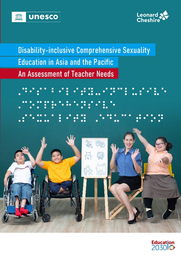Disability-inclusive comprehensive sexuality education in Asia and the Pacific: an assessment of teacher needs

This report highlights findings of a study conducted across Asia-Pacific countries on the experiences and professional learning and development needs of teachers for providing responsive and inclusive Comprehensive Sexual Education (CSE) to learners with disabilities. The research comprises desk review of evidence and teacher training resources; survey data among nearly 4,000 teachers in both mainstream and special education schools; group discussions among educators, learners with disabilities and their parents or caregivers; and, interviews with government policy officials, development partners and civil society organizations working with, and on behalf of learners with disabilities to improve their access to quality, disability-inclusive CSE. A multi-country analysis is complemented by case studies of Mongolia, Nepal and the Philippines, as focus countries of the research.
The study’s analysis seeks to deepen our understanding, and the targeted recommendations aim to inform meaningful action on how to better support teachers in the Asia-Pacific region to provide to diverse learners with disabilities, CSE that responds to their needs and includes their lived realities.
More
Year:
Organisation:
UNESCO Office Bangkok and Regional Bureau for Education in Asia and the Pacific, Leonard Cheshire (UK)
Keywords:
Children with disabilities, Comprehensive sexual education CSE, health, teacher education, Initial teacher education; continuous professional development; teacher education for diversity
Marginalized & Vulnerable group:
Persons with disability
Topic:
System wide approach, Curriculum, Inclusive Pedagogy & Practices
Level of Education:
Across the education sector
Type of Resources:
Research & Policy Papers
Country/Region:
Asia & the Pacific
Language of Publication:
English